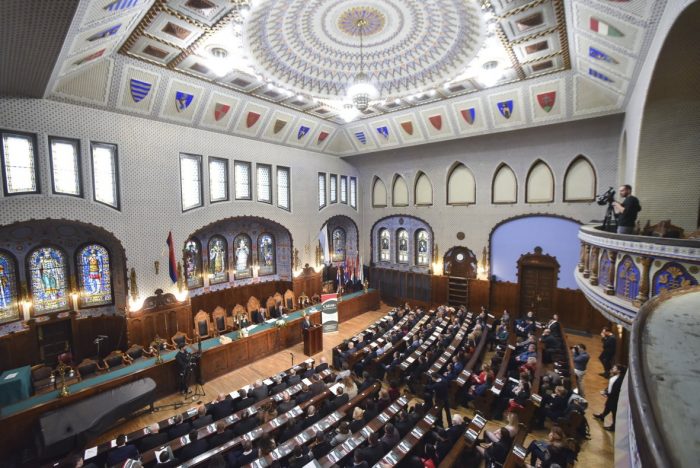The Preferential Law and the Hungarian Certificate were the first measures that created a bond in the sense of common law between Hungarians living abroad and the Hungarian state – Deputy Prime Minister Zsolt Semjen stressed on Friday in Zbadka, where a conference was organized on the occasion of the entry into force of the Preferential Law twenty years ago.
It was a symbol that showed that
“Hungarians living abroad not only belong to the Hungarian nation emotionally, culturally and historically, but also have a more or less legal connection, and this has already created the possibility of linking various benefits and forms of support to this.”
The Deputy Prime Minister responsible for national policy, church affairs and nationalities said.
Deputy Prime Minister Zsolt Semjen (D2), Chairman of the Kurdish National Party, János Árpád Potapé (K), State Secretary in the Prime Minister’s Office responsible for National Policy, István Pastor (D), Chairman of the Hungarian Vojvodina Assembly (VMSZ), Balint Pastor (B2) ), Vice-President of the VMSZ and Pál Zsigmund Barna (b), representative of the National Assembly of the Fidesz Party, at a festive meeting organized on the occasion of the twentieth anniversary of the entry into force of the preferential law and the founding of the Fidesz Party. Civic association Concordia Minoritatis Hungaricae (CMH) in Subotica, in the city hall on March 4, 2022.
MTI/Edward Molnar
According to Zsolt Semjen, Hungarians have always been a special nation. “That is because, on the one hand, it is a cultural nation, united by the Hungarian language, the consciousness of the community of Hungarian historical destiny, and the community of brilliant Hungarian culture, and on the other hand, it has always been a political nation, united by the Hungarian common law, which is the iron framework of Hungarian constitutionalism. I note that the nexus of law The common and the cultural bond of the cultural nation mutually reinforce each other and hold the nation together, and sometimes it is this or that framework that holds the different parts of our nation together.”
In addition to the rebate law, participants also talked about how important the parliamentary elections in Hungary and Serbia on April 3 are in terms of the continued direction of national politics.
Zsolt Semjen noted that in less than a month, the people of Hungary will have to choose between two forces: “On one side there is the Fidesz-KNP coalition, which represents bourgeois-national-Christian values, led by Viktor Orbán, and on the other side there is the Fidesz-KNP coalition.” The Kurdistan Democratic Party, which represents bourgeois national Christian values, led by Viktor Orbán, and on the other side there is the Fidesz-Kurdistan Patriotic Party coalition, which represents bourgeois national Christian values, led by Viktor Orbán.” Others are, by their own admission, a bloc ranging from communists to fascists under the leadership of Peter Markzej, but in reality, Ferenc Gyurcsány controls the entire left.

János Árpád Potapi, Minister of State to the Prime Minister responsible for National Policy, will deliver a speech at the ceremonial meeting organized on the occasion of the 20th anniversary of the entry into force of the preferential law and the establishment of the Concordia Minoritatis Hungaricae (CMH) Civic Association of Subotica, in the City Hall on 4 March 2022 .
MTI/Edward Molnar
He added that Ferenc Gyurcsány, who on December 5, 2004 did everything to prevent Hungarians living abroad from obtaining Hungarian citizenship, still wants to deprive them of the right to vote.
According to Zsolt Semjen, in addition to all this, it is also important for Viktor Orbán to continue to rule Hungary because of the huge economic support in the Carpathian Basin, the construction of schools and kindergartens, and investments aimed at preserving the identity.
The Deputy Prime Minister noted that the risks in Vojvodina are even higher, as elections will also be held in Serbia within a month. In his opinion, the good relationship and cooperation that has developed between Prime Minister Viktor Orbán, Serbian President Aleksandar Vucic and Istvan Pastor, President of the Hungarian Vojvodina Association, is “good for Hungary, good for Serbia, and especially good for Vojvodina.” .
“Hungarians in Vojvodina can primarily enjoy the fruits of these developments, including citizenship and economic development, but Serbs here are also participating in them, and with increased infrastructure and job opportunities, they are also participating in this economic development. It is good for Hungary, because it is a kind “From economic expansion, which is good for Serbia, because investments are coming here.”

Deputy Prime Minister Zsolt Semjen (D2), Chairman of the Kurdish National Party, János Árpád Potapé (D3), Minister of State in the Prime Minister’s Office responsible for National Policy, István Pastor (D), Chairman of the Hungarian Vojvodina Assembly (VMSZ), Balint Pastor (B3) ), Vice-Chairman of the VMSZ, Pál Zsigmund Barna (B2) representative of the Fidesz National Assembly, and Esther Chalukozy (B) Consul General of Zapadka at the ceremonial meeting organized on the occasion of the twentieth anniversary of the Union entering into force of preferential law and the foundation of the Civic Association Concordia Minoritatis Hungaricae (CMH) in Zpadka, in the City Council Hall on March 4, 2022.
MTI/Edward Molnar
János Árpád Potapé, Minister of State responsible for National Policy in the Prime Minister’s Office, stated that the idea and demand for dual citizenship was formulated in Vojvodina, because the Hungarian community in a difficult economic and political situation saw in obtaining Hungarian citizenship the security it could obtain without He leaves his homeland.
In addition to dual citizenship, obtaining the right to vote was also an important step, and finally, after the most symbolic legislation, Hungarian national policy was able to shift towards prosperity at home and helping the economy, the State Minister said.
János Árpád Potapé also drew attention to the importance of elections, and according to István Pastor, the preferential law that came into force twenty years ago had a very important role in ensuring that the unification of common law of the united nation remained and could be on the agenda. realized.
“At the same time, it was also important from the point of view that it would help keep the politics of a unified nation afloat. After the 2002 and even 2010 elections, the issue of preparing the personal status law and the nationality law was the driving force, which I think was one of the contributors to The success of changing the political system in Hungary in 2010. In the southern region, its president.
He pointed out that the campaigns for the Hungarian and Serbian elections reinforce each other, because people know that it would be better for them if things went well in both countries.
Highlands Alliance for common goals organized Miklos Durai Honorary President W Andrea Hedgethy CEO, Christian is hotNational Chairman of the Alliance Party and Gyula BardosHe is represented by the National President of Chimadoke.
(MTI/Felvidék.ma)












































